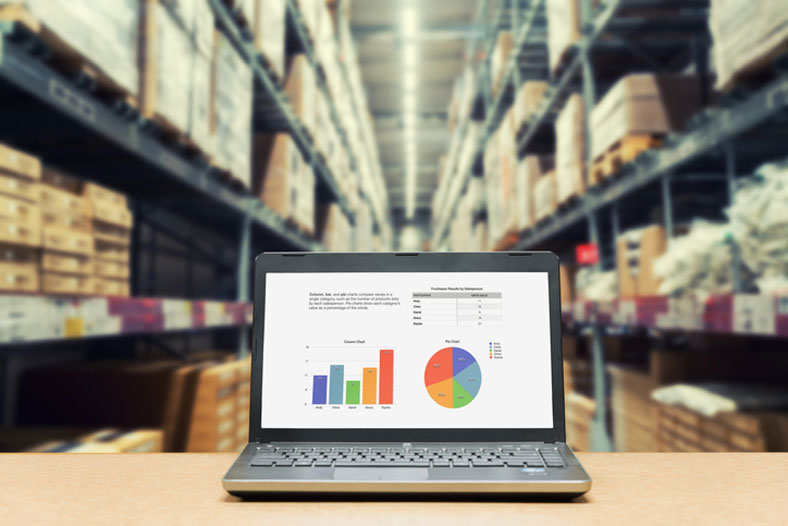Written by Scott Wilson
What is supply chain analytics? Supply chain analytics is the science of examining collected information to inform and enable decision-making in all aspects of logistics and business management. Using big data sets and the tools of data science, supply chain analysts gather and compare historic and real-time information to optimize efficiencies and cost-savings at every point in the supply chain.

Like every other professional field, supply chain management has been completely transformed by data science. The availability of large amounts of raw information together with raging computer horsepower has created a unique specialty within supply chain management.
Everything from the humble RFID tag to satellite-based vessel tracking is dumped into the blender of specialized data analysis techniques. Coming out on the other side are streams of actionable intelligence.
Both supply chain managers and senior business executives use this analysis to make decisions large and small:
- How to pack shipping containers for optimal use of space
- What product lines are generating the highest margins
- Which suppliers are offering the best deals
In a competitive world, supply chain analytics is a must-have skillset for every organization and supply chain manager.
Supply Chain Data Analytics Has Transformed the Logistics Industry

Just as computing power, software, and concepts were becoming mature enough to be used in heavy-duty analytics tasks, transportation systems and international relationships were becoming mature enough for stable and widespread global trade.
Companies have complex problems – sourcing parts and raw materials from every continent, working with suppliers in dozens of countries, and integrating it all into products with thousands of parts and months-long assembly processes. There are multiple critical paths running through their supply chains at any moment. All of them are interdependent. And it’s all far too much for any one person to sit down and analyze.
Supply chain analytics tools offer the solution to that complex problem. They take in reams of data without complaint.
Supply chain management analytics also offer a key to competitive advantage. Exactly because supply chains are so complex, they are rife with inefficiency. In a big system with tons of churn, even minor adjustments can save millions.
Supply chain data analysts can identify redundancies and optimize the number of parts in stock, saving both procurement, storage, and inventory management costs. They can take in shifting weather patterns and suggest new routes for products that shave hours or days off delivery times. They optimize warehouse space, reduce fuel use, and cut time-to-market for new products.
It’s not a stretch to say that the logistics world thrives today only because supply chain data analytics gives it the tools to succeed.
Supply Chain Analytics Software Taps into the Future Today

Throughout history, agents of government and commerce have looked to the information in hand to draw conclusions and make plans. In that sense, supply chain analytics isn’t a new field.
What is new is a combination of capabilities that the supply chain managers of yore never had.
- Near real-time information access - Communication and smart device networks offer a widespread net of information gathering without any human participation
- Wide and deep data storage - All that information coming in is logged and retained in accessible formats on large storage systems
- High-speed computational processors - Finally, extremely fast and powerful computer systems can take and compare that data in a variety of ways
That combination of tools can tease out trends and developments that no human could absorb or infer. And it can do so almost instantly, providing an incredibly detailed picture of supply chain operations as they happen.
Supply Chain Analytics Courses Are Standard in Degrees in Supply Chain Management Today

Supply chain data analytics are so important in the field today that you won’t get out of a college program in the field without devoting time to studying them. In fact, you’re likely to find several such classes in the typical supply chain management degree program. They’ll cover different aspects of supply chain analytics such as:
- Identifying key performance indicators from available data
- Exploring relationships between different types of data
- Considering data sources and reliability in analytics
- Basic statistical analysis techniques
Just as important, supply chain management and logistics degrees tie those concepts to the major concerns in the field. You’ll see how analytics are used in evaluating supplier redundancy, crafting and managing contracts, shaping transportation routes, and allocating storage space.
Full Degree Options Are Also Available in Supply Chain Data Analytics

As with other specialties in supply chain management, analytics has become so intricate that many schools now offer full degrees or concentrations in the field.
It’s most common to find these in graduate degree programs. A Master of Science in Supply Chain Analytics or a Master of Business Administration in Supply Chain Analytics offer advanced and detailed training in the subject. They also come with leadership and general business management skills to tie analytical abilities to business decision-making.
While much of the coursework mirrors the classes listed above, it’s offered in much more detail. And instead of one or two classes in the subject, these programs offer the full slate. They also frequently cross over into the school’s data science course catalog, with additional classes such as:
- Data Management
- Data Exploration and Visualization
- Data and Text Mining
- Analytics for Business Intelligence
- Data-driven Decision Making
Some of the most advanced supply chain analytics programs even offer programming classes in R or Python, common languages used in data science.
You can also earn a Certificate in Supply Chain Analytics. Designed for professionals who already have a background in logistics, or in data science, certificates bridge the gap between the two with a handful of highly-focused classes. That makes them much faster and often less expensive than earning a full degree.
Bringing the HEAT (Harmonized Enterprise Analytic Tool) … and Other Cutting Edge Supply Chain Analytics Tools
 Like other types of high technology, supply chain analytics moves quickly. The state-of-the-art today is old news by tomorrow morning. But even some of the current accomplishments in the field are astounding by any measure.
Like other types of high technology, supply chain analytics moves quickly. The state-of-the-art today is old news by tomorrow morning. But even some of the current accomplishments in the field are astounding by any measure.
UPS, for instance, is a major player in outsourced logistics worldwide. They deliver, on average, about 21 million packages per day. With integrated tracking of package barcodes happening through scanners at every touch point in their system, each of those deliveries generates dozens of data points, tied to thousands of others.
Traditionally, managers reviewed historical patterns from that data and made educated guesses based on experience, and to some degree, on their gut.
But with the introduction of the Harmonized Enterprise Analytic Tool (HEAT), software can analyze it all in real time. Tied to dynamic last-mile routing and tracking systems, fed package sizes and weather conditions, HEAT uses a billion data points daily to create a virtual twin to the real-world package flow in the system. It dynamically routes around blockages and provides instant data to managers.
And new technology like artificial intelligence is likely to drive predictive analytics in the supply chain to new and unexpected heights sooner than you think.
Supply Chain Predictive Analytics Jobs Are Booming in Every Industry

There are no real boundaries to how and where supply chain analytics can be useful. Every organization needs more and deeper insight into their supply chain. That means that pretty much every company that can afford it will be investing in supply chain analytics software and professionals.
Of course, not every company has the deep pockets that are needed to fund those positions and departments. So, supply chain analytics consulting is also a field that is taking off. Consultants specializing in SCM analysis hop from company to company, assessing operations and offering recommendations.
Although the most prominent certification organizations in supply chain management specifically do not yet offer a specific supply chain analytics certification, the Chartered Institute of Professional Certifications offers the Certified Supply Chain Analytics Professional (CSCA™). Consisting of 10 study modules and an examination, the program covers current and future considerations in supply chain analytics.
Many analytics professionals also find value in certifications in areas slightly outside the supply chain field, but which are still applicable. They can include:
- Project Management Professional (PMP)®
- Six Sigma
- Certified Data Scientist from SAS
- Certified Analytics Professional
In a field that is knowledge-heavy, though, it’s often the degree behind supply chain analysts that offers the greatest value. And in a world that increasingly values the ability to get results out of piles of big data, those analysts will continue to be in high demand.







